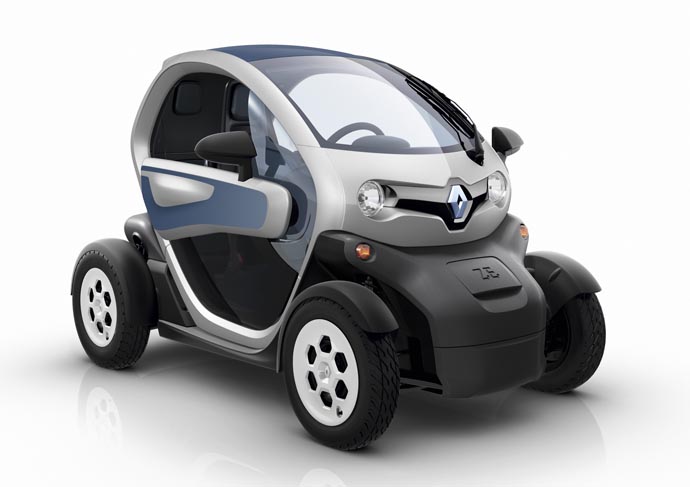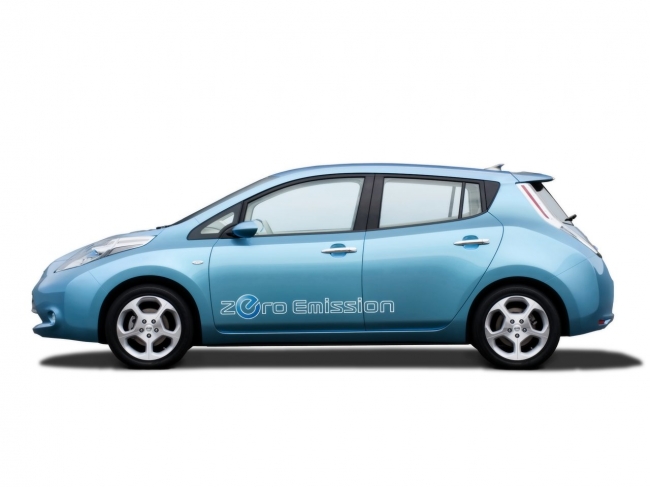A change to the London congestion charge means that previously-exempt sub-100g/km cars such as the Fiat 500 TwinAir, Smart and Toyota Prius will no longer escape the daily £10 fee. Only fully-electric cars and plug-in electric hybrid models will scrape beneath the new exemption threshold of 75g/km.
Cars that will continue to escape the congestion charge include the Nissan Leaf, Toyota Prius Plug-in, Renault Zoe and the Twizy and G-Wiz electric quadricycles.

Still exempt – the Renault Twizy
Apart from exemption from the congestion charge, the advantages of owning an electric vehicle, include free parking and even charging in many areas, zero exhaust pipe emissions, fewer moving parts to fail and result in a car breakdown and silent stop start driving on congested streets. However, these pros come at a financial cost – buying a new electric car is still expensive compared to a low-carbon petrol or diesel-powered car.
Bicycles – the quickest and most fun mode of transport in any congested city – remain free to use.
Road user charging: The bigger picture
 The congestion charge is a misnomer because it is based on emissions rather than whether or not a vehicle is likely to obstruct the flow of traffic. The ETA believes the best way of achieving a strategic road network that is safe, reliable, high quality and with traffic that flows freely is to directly charge the driver for each mile used.
The congestion charge is a misnomer because it is based on emissions rather than whether or not a vehicle is likely to obstruct the flow of traffic. The ETA believes the best way of achieving a strategic road network that is safe, reliable, high quality and with traffic that flows freely is to directly charge the driver for each mile used.
Road user charging would gather the funds to provide well-engineered highways to access every town in Britain. Such is the demand for road space that some roads will continue to be heavily used. If after these well-engineered highways are put in place they are still being over-used, and therefore congested, a congestion charge would be needed too.
A free-flowing national network cannot be built without proper road charging.
For decades successive British governments have failed to invest adequately in road provision. The A14 is a case in point, linking Felixstowe – Britain’s biggest container port – with the rest of the country; it was built on the cheap. Clearly it should have been built to motorway standards from the outset with limited junctions etc but because the finance was not available we are saddled with a road not up to the job. If we had had road user charging at the time of its construction, a well-engineered road could have been provided with ease. Because the government is scared of upsetting the often misinformed drivers’ lobby, many opportunities like these are missed on a yearly basis.
Toll roads
Another example is the M6 Toll road, which opened in 2003 and was intended to relieve congestion. It has been branded ineffective and an expensive answer to traffic problems.
A report by the Campaign for Better Transport claims the M6 Toll – the 27-mile privately-financed motorway that runs between junctions 3a and 12 of the M6 – is losing its operator, Midland Expressway, millions of pounds a year and has not significantly reduced congestion. The cost of using the road has risen above inflation each year, but has nonetheless lost the toll operator an estimated £26 million a year since the road opened.
Tolls that vary in price to take into account the congestion at a particular time of day as well as the weight of a vehicle would be a more sophisticated and equitable alternative to the vehicle excise duty and petrol tax we have now.
This charge is simply a method of charging the motorist for the use of the road. At present the use of the road network is free.

The Nissan Leaf electric car: very little tax revenue for government
A motorist driving an electric car pays no tax or charge for using the roads – no fuel tax because no petrol is used and no vehicle excise duty because electric vehicles are zero rated. But electric vehicles still use roads and roads are valuable. Indeed, a motorist driving a standard family car pays around £900 a year – not for using the roads, but just for having a vehicle and for using petrol – quite a different thing.
So the ETA believes that – for a world-class strategic road network – the government should do the following: be upfront about what our national road network would look like; say how much it would cost to build; and, show how the charges will be collected. There would be many objections – from individuals and organisations but there are convincing arguments to rebut all of them.
At the moment, the government cannot provide any logical reason why a road is a motorway, dual carriageway, an “A” road or a “B” road. Our government needs to declare that all our major cities, like Leeds, and ports, like Hull, will be connected by motorways; that all our cities will be connected by dual-carriageways and all our towns by expressways. All our roads must all be reclassified to make driving easier.
The cost of bringing all the roads up to scratch will be high but affordable. The technology for collecting the road charge has been around for years and is cheap to introduce. Put simply the car, knowing where it is (using its own global positioning device) deducts an amount from an allocated mobile telephone. This system means neither the government nor other members of the household need know where the driver has travelled – so it is good for privacy too.
The ETA believes that most people would prefer the new approach once they got used to it – think about it: no car tax, no fuel duty but instead a charge for the road you use, as you use it. What could be fairer and more transparent than that? We say charge for the whole strategic network as soon as it can be introduced.
Matt
Driving less than two thousand miles a year I would benefit financially but I still think it’s a daft idea not properly thought out by ETA. Charge for use of a strategic network and lots of drivers will do more rat running through residential streets and country lanes causing danger and death to pedestrians, cyclists and horse riders.
The more I see of the daft ideas I see on these ETA Weekly News emails the more I wonder why I ever joined the ETA. This week a jet powered shopper – really environmentally friendly travel. Last week a flying bicycle claimed to be suitable for commuting. What stupid rubbish will they serve up next week?
Ian Byrne
Hello? Is the ETA really saying “Our government needs to declare that all our major cities, like Leeds, and ports, like Hull, will be connected by motorways; that all our cities will be connected by dual-carriageways and all our towns by expressways.” (What’s an expressway, anyway?) This is what I’d expect to hear from the AA, but not the ETA. There is some evidence that if you upgrade and build roads, then more people will use them – they’ll be relatively faster than before and, if they have less congestion, may also be cheaper for drivers. Both are likely to encourage private motoring rather than public transport, as well as longer commutes (by car).
I’m not anti-car, but don’t think we should be encouraging more use.
Toby Harling
Totally disagree with scrapping fuel duty. Fuel is a scarce resource and needs to be conserved, not sold cheaply to encourage journeys by car which otherwise would not have taken place.
Tomthumb
I think the only motoring tax should be a fuel duty – the more you drive, the more you pay. The bigger and less fuel efficient the engine, the more you pay. It’s such an obvious solution, and requires so little bureaucracy to implement, that it’s bound to be overlooked